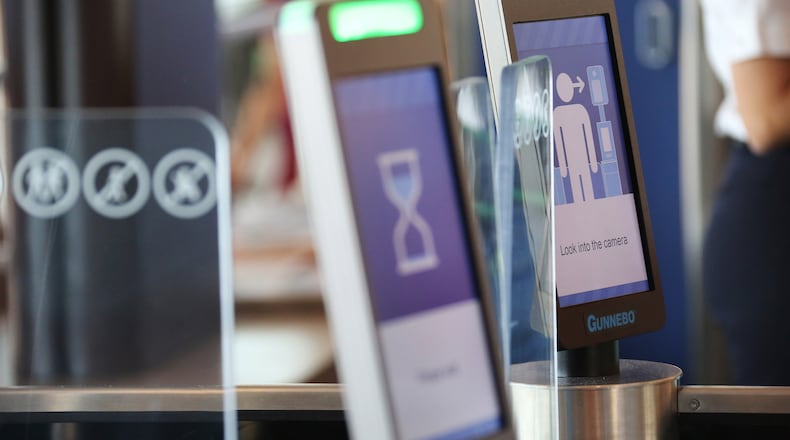Hartsfield-Jackson International Airport plans to test facial recognition at check-in counters in the domestic terminal, part of a broader push to introduce more touchless technology in response to the coronavirus.
Beyond mask requirements, social distancing markers and Plexiglas barriers, the airport is seeking other ways to reduce contact between the tens of thousands of travelers passing through terminals and concourses on a daily basis.
Given the pandemic, ”we all realize that we need to push for this touchless technology,” said Elliott Paige, Hartsfield-Jackson’s air service development director. “A lot of that is being fast-tracked as much as possible.”
Facial recognition is already used in the Atlanta airport’s international terminal, where Delta Air Lines rolled out the technology in 2018 at its check-in counters, boarding gates and at the Transportation Security Administration checkpoint. Customs uses facial recognition at its checkpoints.
At those locations, facial recognition cameras are used to verify identities without travelers having to pull out passports or boarding passes, comparing facial images with a database of passport photos. For Delta, that’s aimed at making the path through the airport a more seamless process with less hassle.
Some consumer privacy advocates have raised concerns about the increased use of facial recognition, and have called for laws to limit its use and the collection of biometric data.
“We’re already seeing surveillance vendors attempt to exploit the COVID-19 pandemic to push for the use” of facial recognition, said Evan Greer, deputy director of digital rights group Fight for the Future, in a written statement. The group is pushing for a ban of facial recognition by law enforcement and corporations and in schools.
It’s yet to be seen whether a push for a “touchless” travel experience to reduce the spread of the virus will change perceptions of facial recognition technology. Delta, when rolling out facial recognition at the international terminal at Hartsfield-Jackson, said those who don’t want their face scanned can opt out. It also said it doesn’t save or store biometric data.
Hartsfield-Jackson expects to start a facial recognition pilot program at some domestic terminal check-in counters by the end of this year, Paige said during a webinar presentation to the Japan-America Society. A traveler’s driver license or ID would be scanned and used for facial recognition. There are also plans to test self-service bag drop using facial recognition.
While Delta has deployed its own facial recognition system, Hartsfield-Jackson plans for a common-use system that any airline could use. The airport said it has not yet finalized which airlines will participate in the pilot, expected to last for a few months to gather data for future applications.
In the last couple of years, the use of facial recognition at airports has grown. Facial recognition is used by U.S. Customs and Border Protection at airports across the country.
Delta has rolled out the use of facial recognition for international travelers at other hubs including Detroit, Minneapolis-St. Paul and Salt Lake City, though it has cut many of its international routes amid the pandemic. JetBlue in 2018 rolled out a self-boarding gate using facial recognition at New York’s John F. Kennedy International Airport. Other airlines have tested facial recognition at other airports.
Many of the facial recognition deployments at airports have been for international travel, using passport databases. Using facial recognition for domestic travel is different since driver license databases are split between different states.
Last year, TSA tested the use of facial recognition to verify the identity of travelers at the security checkpoint at Las Vegas McCarran International Airport, comparing against an image taken from a passenger ID validated as authentic.
Paige said the Atlanta airport is also using other technology to reduce crowding, including beacons to monitor passenger behavior and movements on the concourses. Beacons are wireless transmitters that use Bluetooth technology to send signals to nearby smartphones. The airport also uses sensors to measure security wait times and traveler volumes.
At the world’s busiest airport, in addition to directional signs, architectural design such as lines in tiles and ceilings has long been used to subliminally indicate the correct direction for passenger flow.
Hartsfield-Jackson also plans to replace large touch screens with digital interactive maps. New directories will come with boarding pass scanners to give customized information on how to get to your gate and what concessions or other amenities are on the way, according to Paige.
To reduce queues, some concessionaires at Hartsfield-Jackson have turned to kiosks and mobile ordering, which can also allow for more social distancing. Operator Delaware North said at its Grindhouse Killer Burgers, Einstein Bros. Bagels and Mustard Seed BBQ eateries at Hartsfield-Jackson, signs are equipped with QR codes that can be scanned to pull up a digital menu to order and pay via smartphone, then pick up the food at a designated spot.
The airport also plans to offer “frictionless” payment at a new remote airport parking deck set to open later this year next to the Georgia International Convention Center and connected to the domestic terminal via SkyTrain. At the new ATL West parking deck, Peach Pass users will be able to drive out of the parking deck without stopping to pay at a booth.
The airport scans license plates of vehicles, and those exiting without paying will get a bill in the mail, according to Hartsfield-Jackson General Manager John Selden. Those who don’t pay the bill will likely be asked to pay the next time they use the airport parking deck, he said during a presentation Wednesday.
About the Author
The Latest
Featured



